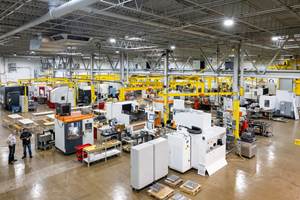Skills Center: Apprentice Training - Shop Safety
The moldmaking industry is in desperate need of highly skilled professionals.
The moldmaking industry is in desperate need of highly skilled professionals. The cry for qualified workers can be heard throughout the country. Because I believe the work done in this industry is not only critical to the success of manufacturing in general, but also that it can be a rewarding career path, I have developed a comprehensive, systematic approach to employee development that incorporates the best of historical training methods with state-of-the-art online and technology-based resources.
In the coming months, I will discuss the supplemental education I believe a shop should consider when training apprentices. This column also will explore the various topics an apprentice might need to understand over the course of his or her career in mold manufacturing. This is intended to help to ensure that the next generation of mold builders has a broad and deep understanding of the industry at large, not just of one company’s approach. My hope is that these articles will help shops add relevance and depth to their individual apprenticeship programs.
As the moldmaking industry continues to address the skills shortage and train the next generation, many company managers have been reinstituting apprenticeship training in a variety of forms. One important element of formal apprenticeship training is called Related Technical Instruction (RTI). This refers to the classes that are necessary for the apprentice to develop the knowledge base that supports the specific skills he or she is learning on the shop floor. Throughout this apprentice training series, we will take a closer look at some of the topics that are commonly covered in a good RTI curriculum.
Many shop managers bemoan the discontinuation of formal high school shop classes, and rightfully so. Because these types of classes are no longer offered, the incoming generation of workers is less likely to have a foundation of information applicable to the moldmaking industry. We used to be able to count on a new apprentice entering the shop with basic machining skills and knowledge. This is no longer the case. Shop owners are being forced to hire apprentice-level employees that have zero shop experience. This puts the onus entirely on the company to ensure that each apprentice learns all the important details of the trade. One area in which this is of utmost importance is shop safety.
Generic safety programs may be inadequate in a moldmaking operation. A mold shop is a fast-paced, constantly changing environment. It requires the worker to have not only a general understanding of how to stay safe in a shop, but also knowledge of specific safety rules that apply to a variety of specific machines and conditions. Shops should add shop-specific guidelines to the generic safety training, including safety rules that apply to machines and equipment that might be unique to that particular company. Here are topics that should be covered in both the generic and mold-shop-specific safety training:
Federal, state and local regulations. Each employee should be aware of the general safety regulations that are enforced by federal, state and local governments. This should include an understanding of the Occupational Safety & Health Admini-stration (OSHA) and how its regulations impact the company. It also can be helpful to relate any history or key areas of focus relative to the company’s previous interaction with OSHA.
First aid and CPR. Companies implement first-aid training at different levels. At minimum, there should be one person in each work area who is certified in first aid and CPR, although some companies choose to train all employees in these areas. Beyond that, all employees should know where to find basic first-aid supplies from their first days on the job.
Accident response. Each company should have a written accident response process that every employee understands and that is posted in highly visible locations, specifically near phones, as accident response procedures often involve making an emergency call.
Personal protective equipment (PPE). What is considered to be required PPE can vary greatly from company to company. For example, some companies require employees to wear long-sleeve shirts to protect the skin during material handling, while other companies prohibit long sleeves because of the risk of them getting caught by exposed turning spindles. Your company’s policy with regards to PPE should be clearly communicated and enforced.
Hazardous communications. Every company is required to communicate information about any hazardous chemicals used in the shop via Material Safety Data Sheets (MSDS), also called Safety Data Sheets (SDS). Every employee should know where these sheets can be found in the shop.
Lock-out/tag-out. Every machine, from presses to lathes to mills, have a way to be locked out of operation for cleaning or repair. The company should train each apprentice on proper lock-out/tag-out procedures specific to its equipment.
Confined spaces. Some large presses or CNC machines may have pits for foundations, chip conveyors or coolant storage. Only properly trained people should allowed in these places, and apprentices must be aware of their limitations without the proper training.
Fork trucks. Quality training about the use of fork trucks is available in many forms, including online, on site or in books. The most effective training incorporates a “road test” for the apprentice that involves common, site-specific operations.
Overhead crane. Similar to training on fork trucks, there is a great deal of high-quality training available on operation of overhead cranes, and the use a practical, site-specific assessment is required. Moldmaking often involves working with large blocks of steel, so it is important that every apprentice has been properly trained on how to flip and handle such blocks.
Machine specifics. CNC machines, manual equipment, grinders and presses are all examples of machines that are common in the mold building industry. There is very little machine-specific safety training available on the market, however, thanks to the variety of styles and sizes. It is important, therefore, that the company points out the clear safety hazards associated with every one of its machines. These can be listed next to or directly on each machine. Ensuring that the apprentice understands the dangers associated with turning spindles, loose clothing, rings, watches and gloves, for example, will help him or her avoid unnecessary injuries. If you are unsure of what to put into your machine-specific safety training, search the internet for terms such as “milling machine safety rules” to get started.
Taking the time to educate apprentices on safety hazards specific to our industry is an important part of building and maintaining a long-term skilled workforce. Upcoming articles will review such topics as success behaviors for the skilled trades, industrial math, inspection and measurement, engineering drawings and CAD, metal removal, CNC milling and turning, a theory of high-efficiency CNC machining, materials science, shop communication methods and tools, and manufacturing standards and process improvement.
Related Content
The Role of Social Media in Manufacturing
Charles Daniels CFO of Wepco Plastics shares insights on the role of social media in manufacturing, how to improve the “business” side of a small mold shop and continually developing culture.
Read MoreTackling a Mold Designer Shortage
Survey findings reveal a shortage of skilled mold designers and engineers in the moldmaking community, calling for intervention through educational programs and exploration of training alternatives while seeking input from those who have addressed the issue successfully.
Read MoreCross Training, In-House Capabilities and Collaborative Design Move Helm Tool Forward
Cross-training, bringing it all in-house, molding and collaborative design are essential to Helm Tool's success.
Read MoreConfronting the Mold Design Talent Drought
Recently, I reposted on LinkedIn the results of an informal survey we conducted, which revealed a shortage of skilled mold designers. It quickly gained a lot of traction. Given the response, I thought I'd summarize the feedback and keep the conversation going.
Read MoreRead Next
Finding, Training & Retaining Employees
In this multi-part series of articles, contributor Ryan Pohl, a journeyman CNC machinist who also holds a master's degree in industrial training and development, addresses the skilled-labor shortage and its potential to dramatically hinder the future sustainability and growth of the moldmaking industry.
Read MoreAre You a Moldmaker Considering 3D Printing? Consider the 3D Printing Workshop at NPE2024
Presentations will cover 3D printing for mold tooling, material innovation, product development, bridge production and full-scale, high-volume additive manufacturing.
Read MoreHow to Use Continuing Education to Remain Competitive in Moldmaking
Continued training helps moldmakers make tooling decisions and properly use the latest cutting tool to efficiently machine high-quality molds.
Read More





















